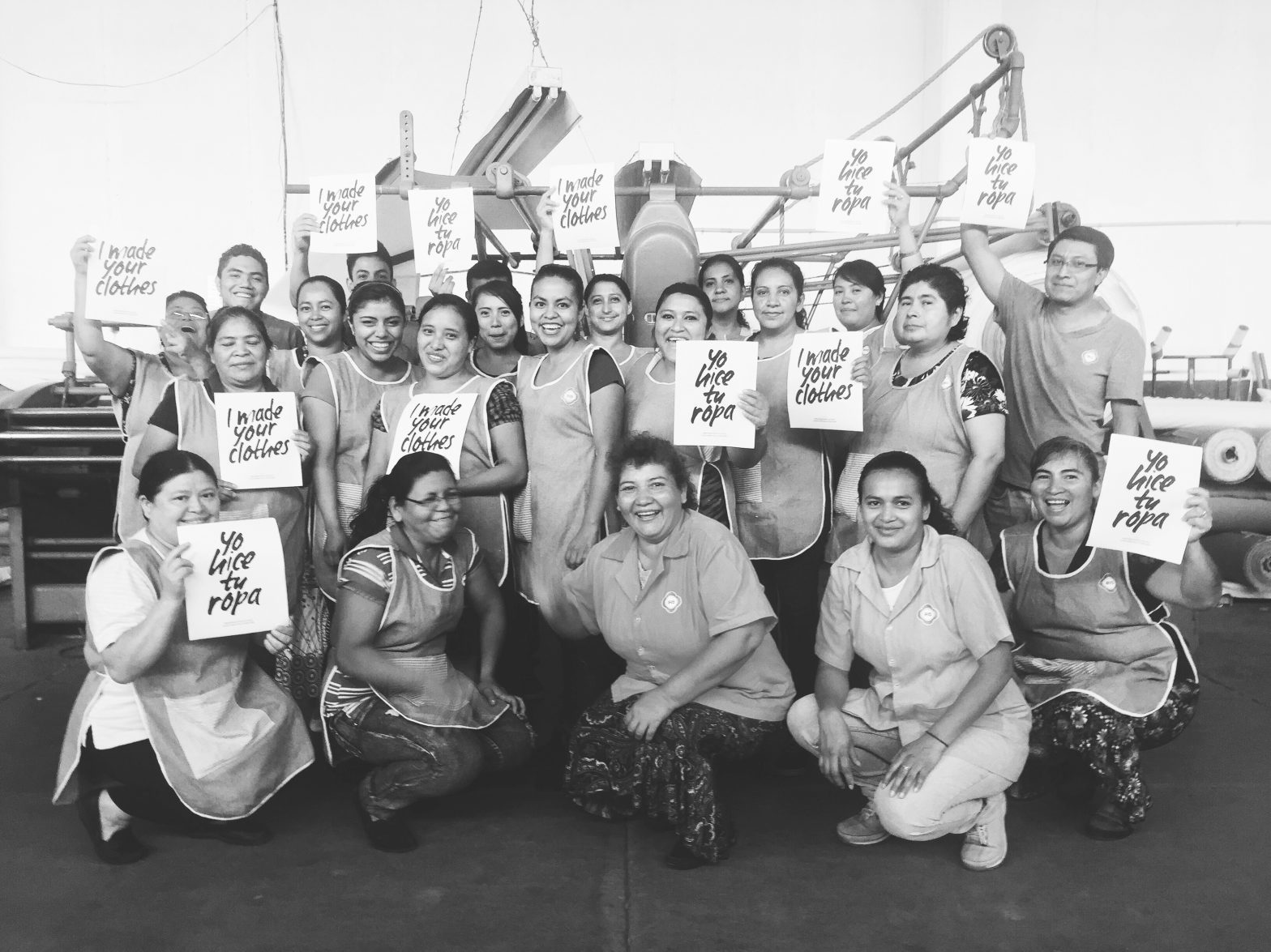“Johanna has been an echo for our work since our very beginning. A phenomenal friend and contributor in our upcycling journey and a true teacher in this new era of design.” The New Denim Project
On the evening of the 7 February, twenty-four Modern Art Oxford staff took part in a ‘performance,’ which involved wearing the handmade garments – or art works – of New York-based Chilean artist Johanna Unzueta at her busy exhibition opening.
In soft hues of grey and khaki, the clothes are reminiscent of factory worker uniforms and are a result of Unzueta’s longstanding relationship with Guatemalan upcycled textiles group, The New Denim Project.
A profound respect and sensitivity for materials and the creative labour behind them appears to have brought Unzueta and the group together over the years. The Guatemalan-based project is part of Iris Textiles, an industrial textiles group founded in 1956, which manufactures 100% sustainable textiles in Guatemalan factories, upheld by leading workplace ethical standards. Their close relationship to factory staff is made evident in their role as campaigners, for they are part of what they proudly call the #FashionRevolution movement – sharing with us consumers the urgent need for a more transparent textiles industry across the world.

Revealing the humanity behind their workers, and the materials that they create, The New Denim Project speak of textiles in terms of body and soul. “They are our second skin,” they say on their website, “they involve an artistic process, a transformation of fibres, evidence of the creative mind. Fabrics tell us stories, breathing history, telling us what is happening and where we’re going.”

This evocation of fabric as a second skin has echoes with Unzueta’s own physical relationship to textiles from a young age. “Everything I’m doing now” the artist reflects “began in my childhood; I have been working with textiles since I was five. I grew up working with my hands. My mum always said I learned to weave and knit before I learned to read and write. Hands are tools for me and I can’t disconnect that.”

A common spirit of respectful exchange underpins both Unzueta’s practice, and the work of The New Denim Project. Collaboration is both an artistic strategy and political commitment to Unzueta, with her publishing projects, performances and, notably, her textiles works often involving the contribution and expertise of others. This manner of working was informed by her early artistic career in post-dictatorship Chile, where collaborative art making and exhibiting in nomadic, artist-led spaces were the only route to creative survival due to the almost complete absence of state arts funding.
The artist’s political representation of her home country is prevalent in another new work in her exhibition – a grainy Super-8 shot film that deals with the post-industrial decline of a previously thriving textiles factory in Tomé, central Chile that once produced almost 80% of the country’s wool textiles. Unzueta’s silent film depicts her own navigation of the factory’s seemingly abandoned industrial spaces, revealing to us gradually that the factory, diminished through bankruptcy, operates, but only just.

According to Clothes Aid, a UK charity, 350,000 tonnes or around £140 million pounds worth of used but still wearable clothing goes to landfill every year. Upcycling, an important process with regards changing both our actions and thinking around recycled clothing, is defined as the process of ‘reusing discarded objects or material in such a way as to create a product of a higher quality or value than the original.’

The New Denim Project carries out what they call a closed-loop process, a form of eco-industrial manufacturing that is chemical and dye free. Solely intended to create sustainably designed textiles, the closed-loop process collects waste from textile mills before they reach the consumer chain and grinds them back into fibre ready to spin once again. Any waste from their upcycling process is later donated to Guatemalan coffee-growers, practising what they call, ‘a endless life cycle.’

The warmth of The New Denim Project’s words when we asked them about working with the artist speak for themselves to the importance of their professional, and personal connection. “Johanna has been an echo for our work since our very beginnings,” they said, “A phenomenal friend and contributor in our upcycling journey and a true teacher in this new era of design. The connection we have with Johanna’s work comes as a result of her genuineness and her understanding of materials and creative processes. Her intimate approach contemplates the entirety of design – from its fiber composition, aesthetic, lifecycle, level of utility and its interconnection to its social and environmental landscape. Johanna’s sensitivity, intellectually and emotionally, takes the collaborative approach to the place the world urges today. It is beyond moving to see how a discarded material has been reclaimed and brought to life once again with such intent. Evidence that the creative mind can bring about any transformation – in materiality and in principle. Grande, Jo!”
With thanks to The New Denim Project for their generous words and images.
Learn more about The New Denim Project on their website here.
Discover more about Modern Art Oxford’s exhibition Johanna Unzueta: Tools for Life here.
